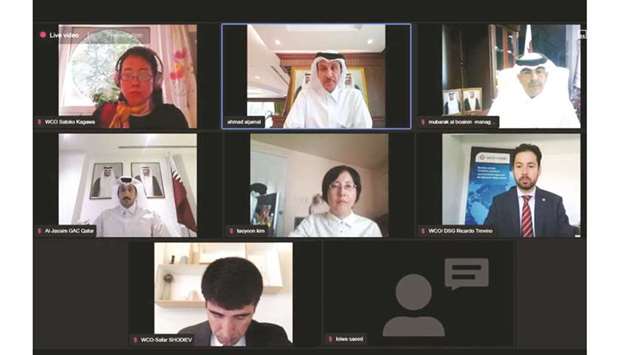The General Authority of Customs (GAC), represented by the Customs Training Center, organised the first regional webinar, as part of the 2020-2021 regional capacity-building plan, titled 'Free Zones for North Africa and the Middle and Near East'.
The three-day webinar aims to enhance Customs capacity building operations in free zones, using World Customs Organisation (WCO) tools and standards.
It also discussed the contribution of free zones to national economies and the proactive participation of Customs in free zones to ensure greater competitiveness, safety, and sustainability, which the countries of the region seek.
The opening session was attended by deputy secretary-general of WCO, Ricardo Chapa, 13 experts from the WCO, and representatives of Customs authorities and administrations of countries in the region.
It also witnessed the participation of the Qatar Free Zones Authority and other free zone authorities in the region.
In his opening speech on this occasion, the GAC chairman, Ahmed bin Abdullah al-Jamal, affirmed the importance of this workshop as it comes within a number of pivotal workshops related to the plan to build regional capacities for Customs cadres, pointing out that the topic of this workshop, which focuses on the role of Customs institutions in supporting the work in free zones, is of great importance, given that free zones have become an integral part of global supply chains, and their establishment is expanding in all countries of the world, as these free zones are considered a strategic necessity to encourage investment and achieve economic growth at the national and regional levels.
He pointed out the important role of Customs in this development via control, supervision, and facilitation of procedures related to regulating the movement of entry and exit of goods in the free zones.
The webinar discussed a number of main themes, most notably assessing the current situation of free zones, the tools and means of the WCO on Customs work in free zones, exchanging national and regional experiences on enhancing co-operation between Customs authorities, and benefiting from the concept of an approved economic operator to facilitate the existing work in these zones.
It also discussed the requirements for the use of information technology in the free zones, ensuring the availability of security and safety requirements, Customs audits, field examinations and Customs control using the various technologies applied in the free zones, determining the origin of goods produced in the free zones and other topics.
The three-day webinar aims to enhance Customs capacity building operations in free zones, using World Customs Organisation (WCO) tools and standards.
It also discussed the contribution of free zones to national economies and the proactive participation of Customs in free zones to ensure greater competitiveness, safety, and sustainability, which the countries of the region seek.
The opening session was attended by deputy secretary-general of WCO, Ricardo Chapa, 13 experts from the WCO, and representatives of Customs authorities and administrations of countries in the region.
It also witnessed the participation of the Qatar Free Zones Authority and other free zone authorities in the region.
In his opening speech on this occasion, the GAC chairman, Ahmed bin Abdullah al-Jamal, affirmed the importance of this workshop as it comes within a number of pivotal workshops related to the plan to build regional capacities for Customs cadres, pointing out that the topic of this workshop, which focuses on the role of Customs institutions in supporting the work in free zones, is of great importance, given that free zones have become an integral part of global supply chains, and their establishment is expanding in all countries of the world, as these free zones are considered a strategic necessity to encourage investment and achieve economic growth at the national and regional levels.
He pointed out the important role of Customs in this development via control, supervision, and facilitation of procedures related to regulating the movement of entry and exit of goods in the free zones.
The webinar discussed a number of main themes, most notably assessing the current situation of free zones, the tools and means of the WCO on Customs work in free zones, exchanging national and regional experiences on enhancing co-operation between Customs authorities, and benefiting from the concept of an approved economic operator to facilitate the existing work in these zones.
It also discussed the requirements for the use of information technology in the free zones, ensuring the availability of security and safety requirements, Customs audits, field examinations and Customs control using the various technologies applied in the free zones, determining the origin of goods produced in the free zones and other topics.

